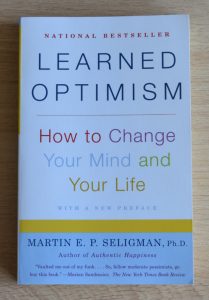This book review blog post features affiliate links – the small percentage granted to The Self Leadership for purchases made through these links supports the work The SLI is doing to empower more self leaders in the world and only products/suppliers that align with the founding principles of The SLI would ever be promoted.
Learned Optimism by Martin Seligman is a powerful book for self leaders in-the-making to understand the importance of flexible optimism and the value of conscious pessimism. Drawing on findings from Seligman’s own research as a professor of psychology, as well as that of his colleagues, and providing an accessible summary of what science tells us about helplessness, depression, pessimism, optimism and therapy; Seligman demonstrates in Learned Optimism how you can enhance your self led life through optimism.
LEARNED OPTIMISM DEMONSTRATES WHY CONSCIOUS, FLEXIBLE OPTIMISM IS ESSENTIAL AS A SELF LEADER
Do optimists live more fulfilling lives? Learned Optimism posits that learning to be an optimist will change your mind and your life for the better.
However, rather than suggesting that everyone learns to be a full-blown optimist, Learned Optimism really extolls the value of ‘flexible optimism’, or ‘optimism with its eyes open’, which we might call pragmatic optimism. As a self leader, it’s important to make conscious choices about when it is valuable to be optimistic and when a healthy dose of pessimism will protect your decision making.
WHY OPTIMISTS HAVE BETTER LIVES, ACCORDING TO LEARNED OPTIMISM
Seligman devotes a considerable portion of Learned Optimism to exploring the background research behind optimism and pessimism, as well as highlighting the bright side of optimism. There are measurable benefits to optimism, including:
However, there is still value in pessimism; especially for certain job roles, as pessimists do tend to avoid high risk failures.
QUALITIES OPTIMISTS AND SELF LEADERS HAVE IN COMMON
Less personalisation – rather than evaluating an event as being your fault; observing when it is down to others and external circumstances.
The ability to evaluate permanence i.e. how long lasting or temporary you think the events are so you can dedicate your energy accordingly.
Awareness of pervasiveness – being able to take a bigger picture view and see whether what happened is specific to this situation or happens across all areas of your life.
Believing that what you choose to do affects what happens to you. Rather than helplessness and believing that your actions are irrelevant, which can lead to low resilience, recognising your own power in a given situation is key to self leadership and optimism.
Consciousness of your own explanatory style/the way you explain to yourself why good or bad events happen.
Some scenarios that demonstrate how optimists and self leaders achieve more successful outcomes:
Example 1: Your manager shouts at you at work
Optimist: He’s shouting at me this one time because of this report which is stressing him out.
Pessimist: He thinks I can’t do anything right and my work is always shoddy.
Example 2: You get given an award at work
Optimist: I am always a hardworking employee, so it’s fantastic that I’ve been recognised.
Pessimist: It’s probably just employee of the month time and I got lucky because they saw one report I did.
Being able to choose how you explain the world to yourself whilst keeping grounded in realism; that’s flexible optimism and the essence of being a powerful self leader.
+ Great for those with a keen interest in science and psychology
+ Highly credible text
+ Useful analogies of how flexible optimism can be applied to different areas of life
+ Includes quizzes to aid self reflection
– Downplays the value of ‘locus of control’ – contrary to other studies
– Only a small amount of the book is dedicated to practical tools and change – if you are looking to develop your own practice then just read chapters 3 and 12
Buy Learned Optimism as a paperback or ebook.
Do you know what impact optimism and pessimism is having on your team? The Self Leadership Initiative provides bespoke training and workshops to Charities, Universities and Corporates to empower more self leaders to take control of their mindsets and make positive conscious choices. Get in touch today to discover the power that a team of self leaders could make for your organisation.
Seligman, Martin E. P. Learned Optimism: How to Change Your Mind and Your Life. New York: Vintage Books, 2006. Print.